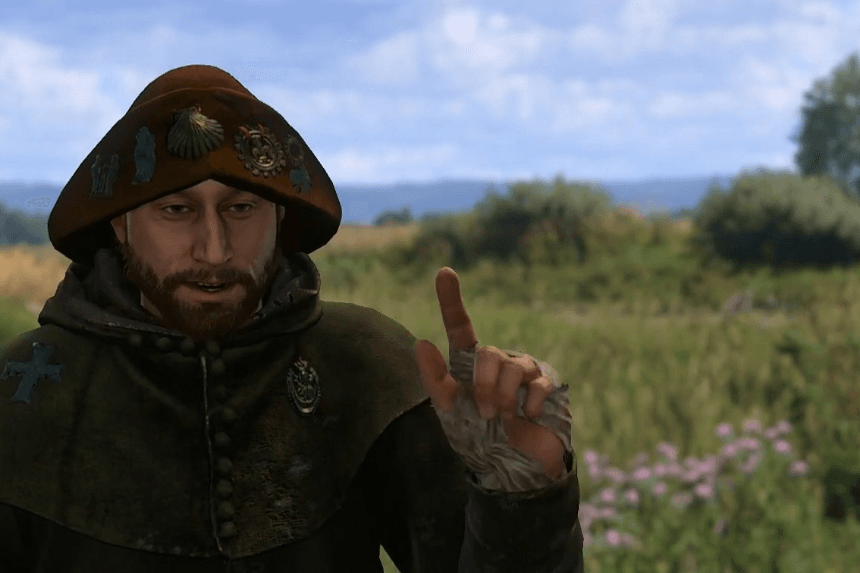In Kingdom Come: Deliverance 2, players may encounter Riddler Barley during their travels through Bohemia. This character challenges the player with a new riddle each time they meet, starting with an easy one, but becoming increasingly difficult as the game progresses.
Since the game lacks a quicksave feature and there’s no guarantee that Riddler Barley will reappear after loading a save, it is important to answer his riddles correctly the first time. To assist with this, a list of all the riddle answers has been compiled in this guide.
It’s worth noting that Barley can appear in both the first and second regions, though his appearances may sometimes be spaced out by a significant amount of time.
Riddler Barley Answers in Kingdom Come Deliverance 2
Below are all the riddles from Barley in Kingdom Come: Deliverance 2, along with the correct answers Henry should choose to earn the rewards.
Riddle One
The first time players meet Barley, he will introduce himself and present his first riddle:
Riddle One: “What belongs to you alone, but is used more often by others?” Answer: “My Name”.
This riddle is fairly straightforward, as it is a well-known one. The other options make no sense, so Henry can quickly select the correct answer. After solving the riddle, Barley will offer a reward. From the player’s second encounter onward, Barley will require a wager of 100 Groschen, so be prepared for this starting at that point.
Riddle Two
When players encounter Barley for the second time, he will require a wager before presenting his next riddle:
Riddle Two: “Once upon a time, there was a foolish farmer with no family or stable boys, so he spoke to his animals instead. A kind man, he shared any Groschen he earned with them according to his own rules. Each hen in the coop received five Groschen, each bee in the hive got fifteen, and the spider in the loft received twenty Groschen. Now, tell me, how much did the cat get?” Answer: “10” (2.5 Groschen per leg).
The difficulty of the riddles increases with this one, as it’s a mathematical puzzle. The key to solving it lies in the amount given to each animal. The farmer’s rule is based on the number of legs each animal has. By dividing the first amount (5 Groschen) by the number of legs, it comes out to 2.5 Groschen per leg. Since the cat has four legs, it receives 10 Groschen.
Riddle Three
The third riddle doesn’t significantly increase in difficulty, but this time, Henry will need to pay 150 Groschen before Barley presents it:
Riddle Three: “Jaromir the coachman was from Raborsch. One morning, he set off for Kuttenberg with an empty coach. Three lads boarded in Bohunowitz. When he arrived in Bojischt, one boy got off, and a washerwoman took his place. In Horschan, the washerwoman left, and a pedlar and his daughter boarded. In Pschitoky, the remaining lads got off, taking the pedlar’s daughter with them. Immediately after, two fishermen got on. When they reached Kuttenberg that evening, the fishermen invited the coachman to the bathhouse, and they all got very drunk. Now, tell me, what was the coachman’s name?” Answer: “Jaromir”.
This riddle is more of a memory test than a true puzzle, meant to check if players were paying attention to the details in the dialogue. For those who tend to skip cutscenes, it may be a bit tricky. The answer is straightforward: the coachman’s name, mentioned at the start of the riddle. After answering correctly, Henry will get his Groschen back and receive a reward of his choice.
Riddle Four
The final riddle in the Barley series is slightly more complex, and once again, it requires a wager of 150 Groschen to take part:
Riddle Four: “One day, a bailiff had twelve men sign up for service. While he was pleased, he soon realized there wasn’t enough gear in the armory for them. The next morning, the twelve men lined up for roll call. Six of them were wearing body armor, four had helmets, and only three wore both a helmet and body armor. Now, tell me, how many men were unlucky enough not to have either a helmet or armor?” Answer: “Five”.
This is another mathematical riddle, where the key is to carefully analyze the provided information. We know that three guards have full body armor, four have helmets, and six wear armor. By examining these details, we can determine that seven guards have at least one piece of equipment. Therefore, it follows that the remaining five men did not receive any gear.

